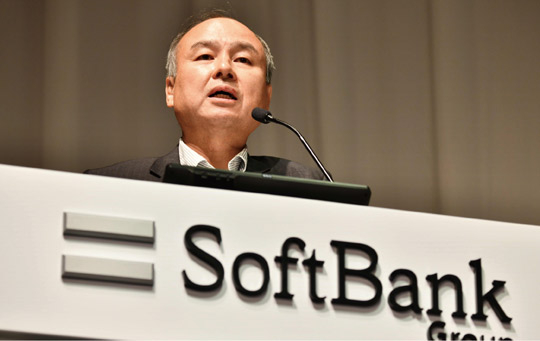Venture capital
Venture capital heavyweights tighten belts after 13-year spending spree
Industry leaders Tiger Global Management and SoftBank have slashed their startup investments through next year
By May 26, 2022 (Gmt+09:00)
5
Min read
Most Read
LG Chem to sell water filter business to Glenwood PE for $692 million


Kyobo Life poised to buy Japan’s SBI Group-owned savings bank


KT&G eyes overseas M&A after rejecting activist fund's offer


StockX in merger talks with Naver’s online reseller Kream


Mirae Asset to be named Korea Post’s core real estate fund operator



The world’s two largest VC firms, Tiger Global Management, LLC and SoftBank Group Corp. have announced reductions to their investment plans.
In South Korea, capital flows into startups shrunk to the lowest level in 15 months.
This is in sharp contrast to last year, a heyday for the VC ecosystem. In the first three quarters of 2021, startups in Korea received a total of 5.3 trillion won ($4.4 billion) from the country’s venture capital firms, a whopping 82% jump from the same period the year previous.
Over in Mountain View, California, startup accelerator Y Combinator had a gloomy outlook for the industry.
“No one can predict how bad the economy will get, but things don’t look good, ” Y Combinator wrote in a letter addressed to its portfolio founders. Titled “Economic Downturn," the letter advised “the safe move is to plan for the worst.”
New York-based Tiger Global has invested in 61 startups over the last two months, according to data shared by CrunchBase on Wednesday. The total number of investments during the entirety of Q2 is estimated to be just 60% of that of the preceding quarter.
SoftBank, which operates Vision Fund worth $100 billion, saw its number of investments decline from 52 in Q1 to just 15 during the months of April and May. Vision Fund is the world’s largest technology-focused investment fund.
The VC juggernauts had led the investment boom last year by quadrupling its number of investments from the year prior.
As the economic growth stagnated and the interest rate hike accelerated, however, both firms adopted a more cautious stance.
During an earnings call on May 12, SoftBank’s chief executive Masayoshi Son announced the company will cut its planned startup investments by 50-75% through next March.
Like Son, a string of VCs have been vocal about an economic downturn in recent months – including VCs in Asia’s fourth-largest economy.
The country’s startup and venture capital database compiler The VC revealed that the investment amount into startups May 1-23 hit the lowest level since February 1-23 last year to just 810.6 billion won ($640 million.) The amount is a 45% plunge from May 2021.
'WINTER IS COMING'
Hit especially hard by the austerity plan are the startups in the later stages of fundraising – from Series D through to pre-IPO.
“Whereas the venture market remains vibrant for startups prior to the Series B round; there is the possibility that investments into the early stage startups could also contract over time,” an industry insider told The Korea Economic Daily.
Industry insiders are using the phrase “winter is coming” from the popular HBO series Game of Thrones to predict hard times ahead.

Existing shareholders' stocks are valued at a more discounted corporate value of 2 trillion won.
Taking a look at the venture capital situation worldwide, the new investment amount into startups in the month of April fell 12% to $47 billion won compared to the same month last year.
Funds have ebbed in South America, which was widely considered to be the rising star in regard to venture capital investment. The investment amount in the region plunged 30% to $3.4 billion in Q1 from the previous quarter.
Last year, SoftBank’s Vision Fund saw a loss of 3.5 trillion yen ($27.5 billion,) hit by the plunging value of Chinese tech companies in its portfolio such as ride hailing app Didi and e-commerce operator Alibaba.
Other companies in its portfolio, namely US co-working space provider WeWork and British semiconductor and software design company Arm, also added to the losses.
During the SoftBank Group's May earnings call, the Korean-Japanese entrepreneur said future decisions will depend on the company’s “loan-to-value (LTV) levels and investment opportunities.”
Tiger Global, for its part, also lost some $17 billion so far this year.
Mesh Korea, the operator of logistics service provider VROONG, is reportedly conducting an investment round with a valuation of 800 billion won.
Those familiar with the development said the startup has lowered its expectations from aspiring to become the next unicorn, or a private company with a valuation of over $1 billion.

Viva Republica Inc., the Seoul-based fintech company behind Toss, is in the process of a pre-IPO round worth 1 trillion won. While the fintech startup was aiming for a valuation of over 20 trillion won, its market capitalization has plunged to 12 trillion won.
Earlier this year, Viva Republica was widely expected to become the country's fourth decacorn – a private, venture-backed company with a valuation of at least $10 billion– after its IPO.
Not all is lost in the bear market, with some experts saying the time is ripe to filter out the lackluster startups from the promising ones. In other words, some are hopeful that venture capital firms will conduct more stringent due diligence.
Optimists are saying that the Ice Age that followed the Dot-Com Bubble of the 1990s will not repeat in the venture capital sector. Unlike the internet companies of yore, much of the startup and VC ecosystem is buoyed by government funding, such as pension funds.
Write to Lan Heo, Jong-Woo Kim, Jeong-Soo Hwang at why@hankyung.com
Jee Abbey Lee edited this article.
More to Read
-
 Venture capitalHumbling experience leads to VC success – LG Tech Ventures CEO
Venture capitalHumbling experience leads to VC success – LG Tech Ventures CEOMay 24, 2022 (Gmt+09:00)
3 Min read -
 Korean startupsStartup accelerator D.Camp generates $22 billion in value in 10 years
Korean startupsStartup accelerator D.Camp generates $22 billion in value in 10 yearsMay 23, 2022 (Gmt+09:00)
3 Min read -
 Korean startupsRetail investment amount in startups triples on-year in Q1
Korean startupsRetail investment amount in startups triples on-year in Q1Apr 28, 2022 (Gmt+09:00)
1 Min read -
 Korean startupsStartup accelerator Klim Ventures secures $4 mn in bridge capital
Korean startupsStartup accelerator Klim Ventures secures $4 mn in bridge capitalApr 26, 2022 (Gmt+09:00)
1 Min read -
 Venture capitalS.Korean accelerators FuturePlay and Bluepoint Partners rev up for IPOs
Venture capitalS.Korean accelerators FuturePlay and Bluepoint Partners rev up for IPOsApr 25, 2022 (Gmt+09:00)
2 Min read
Comment 0
LOG IN


